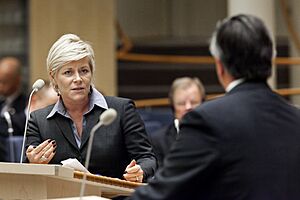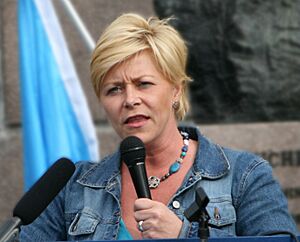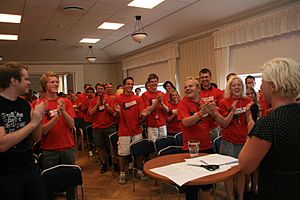Siv Jensen facts for kids
Quick facts for kids
Siv Jensen
|
|
|---|---|
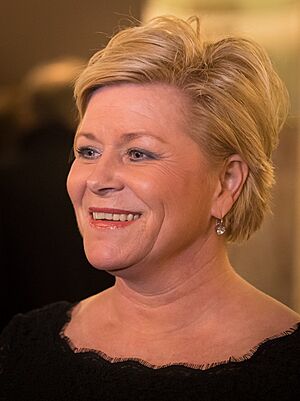
Jensen in 2017
|
|
| Minister of Finance | |
| In office 16 October 2013 – 24 January 2020 |
|
| Prime Minister | Erna Solberg |
| Preceded by | Sigbjørn Johnsen |
| Succeeded by | Jan Tore Sanner |
| Leader of the Progress Party | |
| In office 6 May 2006 – 8 May 2021 |
|
| First Deputy | Per Sandberg Sylvi Listhaug |
| Second Deputy | Per Arne Olsen Ketil Solvik-Olsen Terje Søviknes |
| Preceded by | Carl I. Hagen |
| Succeeded by | Sylvi Listhaug |
| First Deputy Leader of the Progress Party | |
| In office 2 May 1999 – 6 May 2006 |
|
| Leader | Carl I. Hagen |
| Preceded by | Lodve Solholm |
| Succeeded by | Per Sandberg |
| Parliamentary Leader of the Progress Party | |
| In office 28 January 2020 – 8 May 2021 |
|
| Leader | Herself |
| Preceded by | Hans Andreas Limi |
| Succeeded by | Sylvi Listhaug |
| In office 5 October 2005 – 17 October 2013 |
|
| Leader | Carl I. Hagen Herself |
| Preceded by | Carl I. Hagen |
| Succeeded by | Harald T. Nesvik |
| Member of the Norwegian Parliament | |
| In office 1 October 1997 – 30 September 2021 |
|
| Deputy | Mazyar Keshvari |
| Constituency | Oslo |
| Deputy Member of the Storting | |
| In office 1 October 1993 – 30 September 1997 |
|
| Constituency | Oslo |
| Personal details | |
| Born | 1 June 1969 Oslo, Norway |
| Political party | Progress |
| Alma mater | Norwegian School of Economics |
Siv Jensen (born 1 June 1969) is a well-known Norwegian politician. She was the leader of the Progress Party from 2006 to 2021. She also served as the Minister of Finance for Norway from 2013 to 2020. This was part of the Solberg Cabinet, a government led by Erna Solberg. Jensen was also a member of the Storting, which is the Norwegian parliament, representing Oslo from 1997 to 2021.
Siv Jensen grew up in Oslo and studied business at the Norwegian School of Economics. She was first elected to parliament in 1997. She was re-elected four times after that. From 2001 to 2005, she led the parliamentary committee for finance and economy. In 2006, she took over as leader of the Progress Party from Carl I. Hagen.
Jensen was the Progress Party's choice for Prime Minister in the 2009 election. Her party achieved very high results that year. For the 2013 election, she supported forming a government with the Conservative Party. She then led her party into the Solberg Cabinet. This was the first time the Progress Party had ever been part of a government. In October 2019, Jensen became Norway's longest-serving Minister of Finance since World War II.
Contents
Early Life and Education
Siv Jensen was born in Oslo, Norway. Her parents, Tore Jensen and Monica Kjelsberg, owned a shoe store. Her parents divorced around 1980. Her mother was briefly involved in local politics.
Jensen finished elementary school in 1985. She then attended Oslo Commerce School and graduated in 1988. After that, she went to the Norwegian School of Economics. She earned her business degree in 1992. She worked as a sales consultant for a radio station until 1994. Then, she started working full-time in politics.
Jensen has said her interest in politics began in elementary school. She often had discussions in class with friends who had different political views. She joined the Progress Party in 1988. Her mother had introduced her to the party. Before that, she was briefly a member of the Norwegian Young Conservatives.
Political Career
Serving in Parliament
Jensen became a member of the Storting (Norwegian parliament) in 1997. She represented the Oslo area. Before that, she was a deputy representative from 1993 to 1997. When she became a government minister in 2013, Mazyar Keshvari took her place in parliament.
From 2001 to 2005, Jensen led the Standing Committee on Finance and Economic Affairs. She had been a member of this committee since 1997. From 2005 to 2013, she was part of the Standing Committee on Foreign Affairs and Defence. She played a key role in budget talks with the government led by Kjell Magne Bondevik. Her work on the Finance Committee helped her become a more prominent leader in her party.
Leading the Progress Party
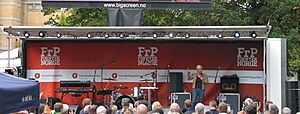
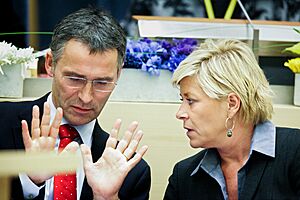
In the early 1990s, there were disagreements within the Progress Party. Jensen supported the long-time party leader, Carl I. Hagen. She became the first deputy chairman of the party in 1998. In 2005, she became the party's parliamentary leader. In 2006, Carl I. Hagen stepped down as party chairman after leading since 1978. Jensen then became the new leader of the Progress Party without any opposition.
Many people wondered how the party would do without Hagen. However, a 2004 survey showed that Jensen was more popular than him. This was because she was seen as less controversial. Some thought she would make the party more moderate. But she stuck to the party's main ideas. Her leadership style was considered softer than Hagen's.
In May 2009, Jensen gave a speech in the House of Commons of the United Kingdom. She was invited by a British politician. The invitation was due to her interest in topics like terrorism and multicultural societies. Jensen said that Britain had "failed completely" in its immigration policy.
As the leader, Jensen started talks with Conservative Party leader Erna Solberg in 2007. They wanted to form a strong center-right group for the 2009 election. When they couldn't agree, Jensen ran for Prime Minister herself in 2009. Her party got a record 22.9% of the votes. However, the center-left parties still won the election.
In 2011, a newspaper noted that the Progress Party had its "two best national elections" under Jensen's leadership. Before the 2013 election, Jensen continued to work for a center-right government. She supported Erna Solberg as Prime Minister. Even though her party's votes dropped, she led the Progress Party into a government coalition for the first time.
On January 20, 2020, Jensen announced that her party was leaving the government. This was a protest against a decision to bring home a woman linked to ISIS and her sick child. She also said the party couldn't push its policies enough in government. Jensen and other Progress Party ministers officially left the government on January 24. This was the first time a party had ever left a government in Norway.
On February 18, 2021, Jensen announced she would step down as party leader. This happened after a new leader was chosen at the party meeting in May. She also decided not to run for re-election in the September 2021 election. She said she wanted to focus more on her personal life. She suggested Sylvi Listhaug as her preferred successor. Listhaug was later chosen and officially became leader on May 8.
Serving as Minister of Finance
On October 16, 2013, Jensen became the Minister of Finance. The Progress Party joined a minority government led by the Conservative Party. This was the first time the party had ever been part of a government. Jensen's first national budget suggested cutting taxes. It also proposed spending more of Norway's oil money. She also set up a group to look at changing how Norway spends money from its Oil Fund.
Post-Political Career
In August 2021, it was announced that Jensen would lead an organization focused on preventing drowning. This organization was started by the Norwegian Society for Sea Rescue. In June 2022, the organization was named Flyte. She left this role in January 2024 to become a political advisor.
Political Views
Economic Ideas
Jensen has described her party as a "classical liberal party." She says its main focus is on "individual freedom, individual rights, less state and more individual freedom." She also believes in "more competition instead of less." This is because she thinks state-controlled businesses are not good for competition or prices.
Some British newspapers have called her a "Norwegian Margaret Thatcher." Jensen has said that former British Prime Minister Margaret Thatcher is one of her "political heroes." She admires Thatcher for being a strong politician who stood up for her beliefs. Jensen supports Thatcher's ideas, like believing that a market economy is the best way.
Support for Israel
Jensen is a strong supporter of Israel. She has stated that she is "not afraid to defend Israel's right to defend itself." In the summer of 2008, she visited the Israeli city of Sderot. She experienced a Hamas bombing there and had to run to a shelter. She strongly disagreed with the Norwegian government's decision to recognize Hamas. She believes "you don't negotiate with terrorists." Jensen has also suggested moving the Norwegian embassy in Israel from Tel Aviv to Jerusalem. She is also open to recognizing a future Palestinian state.
In January 2009, during the Gaza War, she spoke at a demonstration in Oslo supporting Israel. The Progress Party's stance on Israel, and Jensen's appearance, led many Christian voters to support the Progress Party. Soon after, the Norwegian Police Security Service warned that Jensen might be a target for attacks. During her speech, which happened during the 2008–09 Oslo riots, rioters threw rocks. Jensen had to leave the stage.
Views on Radical Islam
In February 2009, Jensen gave a speech warning about what she called a "sneaking Islamisation" of Norway. This was during a public discussion about allowing the hijab as part of police uniforms. There were also demands from some Muslim groups for Muslim-only education and special food in prisons. Her speech caused a lot of debate among other political parties.
She used the city district of Rosengård in Malmö, Sweden, as an example of failed integration. She claimed that Sharia law had replaced Swedish law there. She also said emergency workers couldn't drive into certain areas. These statements were very controversial in Sweden. The Progress Party was invited to visit Rosengård by the mayor and police chief of Malmö. Jensen herself did not join the tour.
In March 2009, she said that fighting radical Islam was "the most important fight of our time." She stated that as a classical liberal, she would always fight against totalitarian ideas. She compared radical Islam to communism and National Socialism, calling it a "dark and scary ideology." She also accused other parties of being afraid to discuss these issues. She claimed they "close their eyes" and pretend to be tolerant.
In early 2010, thousands of Muslims protested in Oslo. Jensen then changed her claim of a "sneak-Islamisation" to a "full-blown Islamisation." During the protest, an Islamist speaker warned of a "9/11" or "7/7" type event in Norway. This was in response to a newspaper publishing a cartoon of Muhammad.
Climate Change Views
In December 2008, Jensen questioned the idea that climate change is mainly caused by humans and is dangerous. She mentioned past ideas about global cooling to create doubt about climate science. However, she generally supports expanding and researching renewable energy. In January 2010, she criticized the IPCC. She accused their report of using incorrect information. She referred to errors about Himalayan glaciers melting and predictions by Al Gore.
Personal Life
Siv Jensen has a younger brother, Tom Einar Jensen, who is a businessman. She also has a younger sister, Nina Jensen, who used to be the CEO of WWF Norway. Her great-grandmother, Betzy Kjelsberg, was an early feminist. Although she was once engaged, Jensen has never married.
Jensen has said she is a "proud member of the Church of Norway." However, she has some personal doubts about certain Christian beliefs. She has criticized church leaders for getting too involved in politics. This includes their public opposition to Norwegian oil drilling.
In 2006, a book about Siv Jensen was published. It was written by Martine Aurdal, who was the editor of a feminist magazine.
See also
 In Spanish: Siv Jensen para niños
In Spanish: Siv Jensen para niños
 | James Van Der Zee |
 | Alma Thomas |
 | Ellis Wilson |
 | Margaret Taylor-Burroughs |


